Consolidated Portfolio of Project Management Methodologies PPMP20009
VerifiedAdded on 2023/06/12
|46
|11155
|93
Portfolio
AI Summary
This consolidated portfolio provides an overview of the learning outcomes achieved throughout a 12-week course on Project Management Methodologies (PPMP20009). It discusses the reasons why organizations adopt project management methodologies, the impact of these methodologies on stakeholders, and the major elements of a project management methodology that meet organizational needs. The portfolio includes reflections on the different project management methodologies, the importance of stakeholder engagement, and the critical elements required for successful project execution, such as project planning, resource allocation, and risk management. Evidence from weekly portfolios is included to support the learning outcomes, demonstrating an understanding of project constraints, ethical considerations, and best practices in project management. The document emphasizes the significance of choosing the right project management methodology for ensuring project success and achieving organizational goals. Desklib offers a wide array of solved assignments and study resources for students.
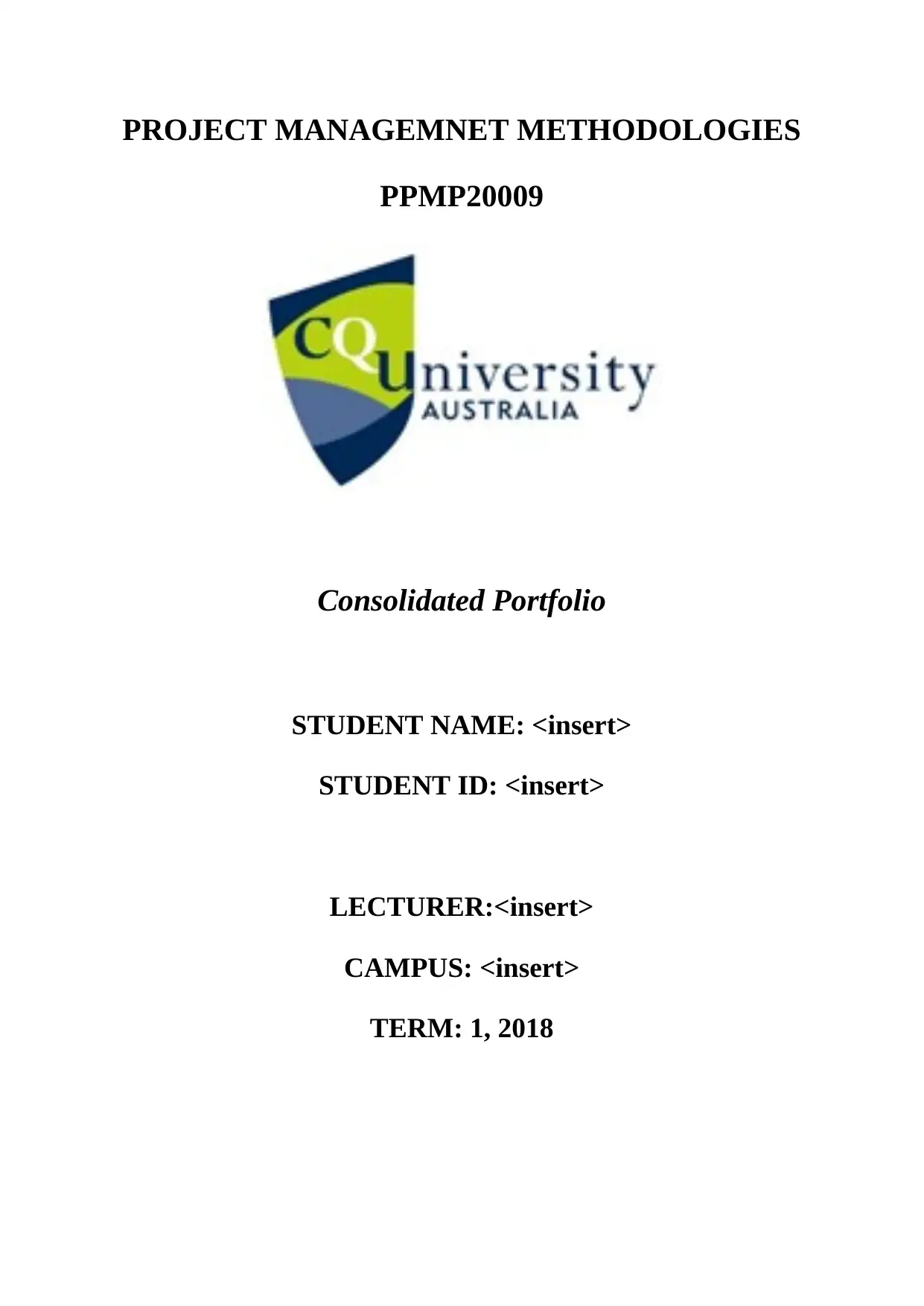
PROJECT MANAGEMNET METHODOLOGIES
PPMP20009
Consolidated Portfolio
STUDENT NAME: <insert>
STUDENT ID: <insert>
LECTURER:<insert>
CAMPUS: <insert>
TERM: 1, 2018
PPMP20009
Consolidated Portfolio
STUDENT NAME: <insert>
STUDENT ID: <insert>
LECTURER:<insert>
CAMPUS: <insert>
TERM: 1, 2018
Paraphrase This Document
Need a fresh take? Get an instant paraphrase of this document with our AI Paraphraser
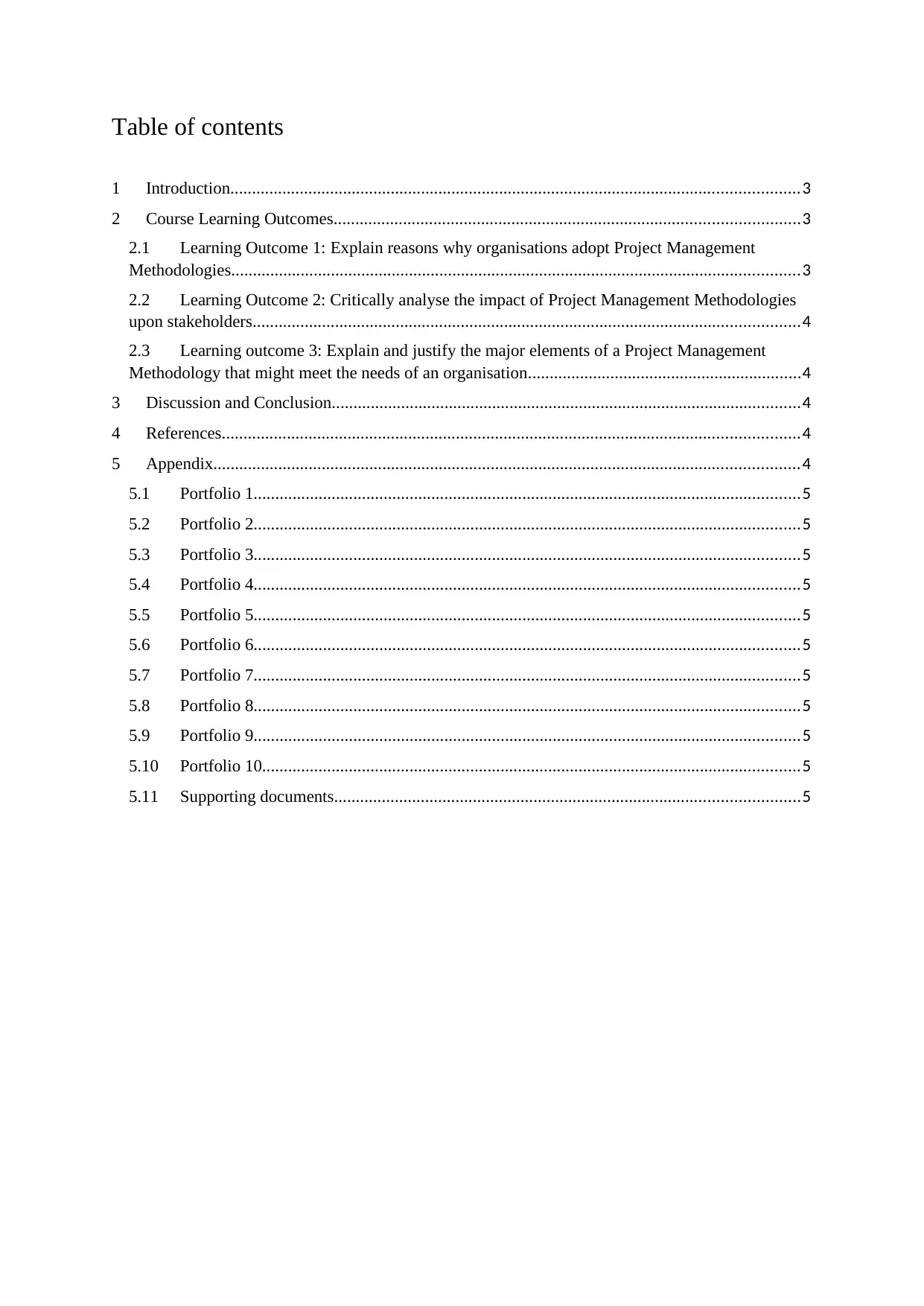
Table of contents
1 Introduction...................................................................................................................................3
2 Course Learning Outcomes...........................................................................................................3
2.1 Learning Outcome 1: Explain reasons why organisations adopt Project Management
Methodologies...................................................................................................................................3
2.2 Learning Outcome 2: Critically analyse the impact of Project Management Methodologies
upon stakeholders..............................................................................................................................4
2.3 Learning outcome 3: Explain and justify the major elements of a Project Management
Methodology that might meet the needs of an organisation...............................................................4
3 Discussion and Conclusion............................................................................................................4
4 References.....................................................................................................................................4
5 Appendix.......................................................................................................................................4
5.1 Portfolio 1..............................................................................................................................5
5.2 Portfolio 2..............................................................................................................................5
5.3 Portfolio 3..............................................................................................................................5
5.4 Portfolio 4..............................................................................................................................5
5.5 Portfolio 5..............................................................................................................................5
5.6 Portfolio 6..............................................................................................................................5
5.7 Portfolio 7..............................................................................................................................5
5.8 Portfolio 8..............................................................................................................................5
5.9 Portfolio 9..............................................................................................................................5
5.10 Portfolio 10............................................................................................................................5
5.11 Supporting documents...........................................................................................................5
1 Introduction...................................................................................................................................3
2 Course Learning Outcomes...........................................................................................................3
2.1 Learning Outcome 1: Explain reasons why organisations adopt Project Management
Methodologies...................................................................................................................................3
2.2 Learning Outcome 2: Critically analyse the impact of Project Management Methodologies
upon stakeholders..............................................................................................................................4
2.3 Learning outcome 3: Explain and justify the major elements of a Project Management
Methodology that might meet the needs of an organisation...............................................................4
3 Discussion and Conclusion............................................................................................................4
4 References.....................................................................................................................................4
5 Appendix.......................................................................................................................................4
5.1 Portfolio 1..............................................................................................................................5
5.2 Portfolio 2..............................................................................................................................5
5.3 Portfolio 3..............................................................................................................................5
5.4 Portfolio 4..............................................................................................................................5
5.5 Portfolio 5..............................................................................................................................5
5.6 Portfolio 6..............................................................................................................................5
5.7 Portfolio 7..............................................................................................................................5
5.8 Portfolio 8..............................................................................................................................5
5.9 Portfolio 9..............................................................................................................................5
5.10 Portfolio 10............................................................................................................................5
5.11 Supporting documents...........................................................................................................5
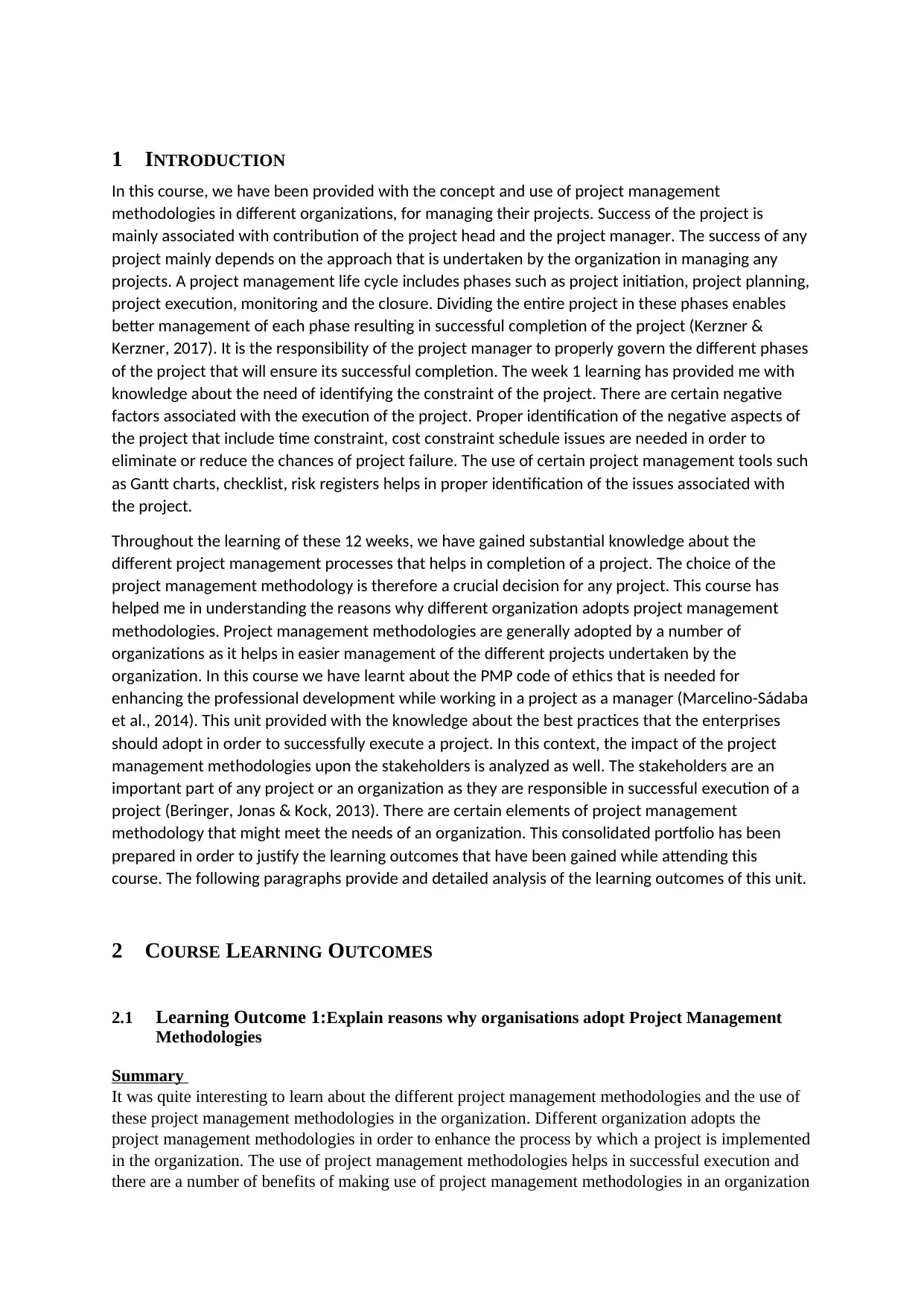
1 INTRODUCTION
In this course, we have been provided with the concept and use of project management
methodologies in different organizations, for managing their projects. Success of the project is
mainly associated with contribution of the project head and the project manager. The success of any
project mainly depends on the approach that is undertaken by the organization in managing any
projects. A project management life cycle includes phases such as project initiation, project planning,
project execution, monitoring and the closure. Dividing the entire project in these phases enables
better management of each phase resulting in successful completion of the project (Kerzner &
Kerzner, 2017). It is the responsibility of the project manager to properly govern the different phases
of the project that will ensure its successful completion. The week 1 learning has provided me with
knowledge about the need of identifying the constraint of the project. There are certain negative
factors associated with the execution of the project. Proper identification of the negative aspects of
the project that include time constraint, cost constraint schedule issues are needed in order to
eliminate or reduce the chances of project failure. The use of certain project management tools such
as Gantt charts, checklist, risk registers helps in proper identification of the issues associated with
the project.
Throughout the learning of these 12 weeks, we have gained substantial knowledge about the
different project management processes that helps in completion of a project. The choice of the
project management methodology is therefore a crucial decision for any project. This course has
helped me in understanding the reasons why different organization adopts project management
methodologies. Project management methodologies are generally adopted by a number of
organizations as it helps in easier management of the different projects undertaken by the
organization. In this course we have learnt about the PMP code of ethics that is needed for
enhancing the professional development while working in a project as a manager (Marcelino-Sádaba
et al., 2014). This unit provided with the knowledge about the best practices that the enterprises
should adopt in order to successfully execute a project. In this context, the impact of the project
management methodologies upon the stakeholders is analyzed as well. The stakeholders are an
important part of any project or an organization as they are responsible in successful execution of a
project (Beringer, Jonas & Kock, 2013). There are certain elements of project management
methodology that might meet the needs of an organization. This consolidated portfolio has been
prepared in order to justify the learning outcomes that have been gained while attending this
course. The following paragraphs provide and detailed analysis of the learning outcomes of this unit.
2 COURSE LEARNING OUTCOMES
2.1 Learning Outcome 1:Explain reasons why organisations adopt Project Management
Methodologies
Summary
It was quite interesting to learn about the different project management methodologies and the use of
these project management methodologies in the organization. Different organization adopts the
project management methodologies in order to enhance the process by which a project is implemented
in the organization. The use of project management methodologies helps in successful execution and
there are a number of benefits of making use of project management methodologies in an organization
In this course, we have been provided with the concept and use of project management
methodologies in different organizations, for managing their projects. Success of the project is
mainly associated with contribution of the project head and the project manager. The success of any
project mainly depends on the approach that is undertaken by the organization in managing any
projects. A project management life cycle includes phases such as project initiation, project planning,
project execution, monitoring and the closure. Dividing the entire project in these phases enables
better management of each phase resulting in successful completion of the project (Kerzner &
Kerzner, 2017). It is the responsibility of the project manager to properly govern the different phases
of the project that will ensure its successful completion. The week 1 learning has provided me with
knowledge about the need of identifying the constraint of the project. There are certain negative
factors associated with the execution of the project. Proper identification of the negative aspects of
the project that include time constraint, cost constraint schedule issues are needed in order to
eliminate or reduce the chances of project failure. The use of certain project management tools such
as Gantt charts, checklist, risk registers helps in proper identification of the issues associated with
the project.
Throughout the learning of these 12 weeks, we have gained substantial knowledge about the
different project management processes that helps in completion of a project. The choice of the
project management methodology is therefore a crucial decision for any project. This course has
helped me in understanding the reasons why different organization adopts project management
methodologies. Project management methodologies are generally adopted by a number of
organizations as it helps in easier management of the different projects undertaken by the
organization. In this course we have learnt about the PMP code of ethics that is needed for
enhancing the professional development while working in a project as a manager (Marcelino-Sádaba
et al., 2014). This unit provided with the knowledge about the best practices that the enterprises
should adopt in order to successfully execute a project. In this context, the impact of the project
management methodologies upon the stakeholders is analyzed as well. The stakeholders are an
important part of any project or an organization as they are responsible in successful execution of a
project (Beringer, Jonas & Kock, 2013). There are certain elements of project management
methodology that might meet the needs of an organization. This consolidated portfolio has been
prepared in order to justify the learning outcomes that have been gained while attending this
course. The following paragraphs provide and detailed analysis of the learning outcomes of this unit.
2 COURSE LEARNING OUTCOMES
2.1 Learning Outcome 1:Explain reasons why organisations adopt Project Management
Methodologies
Summary
It was quite interesting to learn about the different project management methodologies and the use of
these project management methodologies in the organization. Different organization adopts the
project management methodologies in order to enhance the process by which a project is implemented
in the organization. The use of project management methodologies helps in successful execution and
there are a number of benefits of making use of project management methodologies in an organization
⊘ This is a preview!⊘
Do you want full access?
Subscribe today to unlock all pages.

Trusted by 1+ million students worldwide
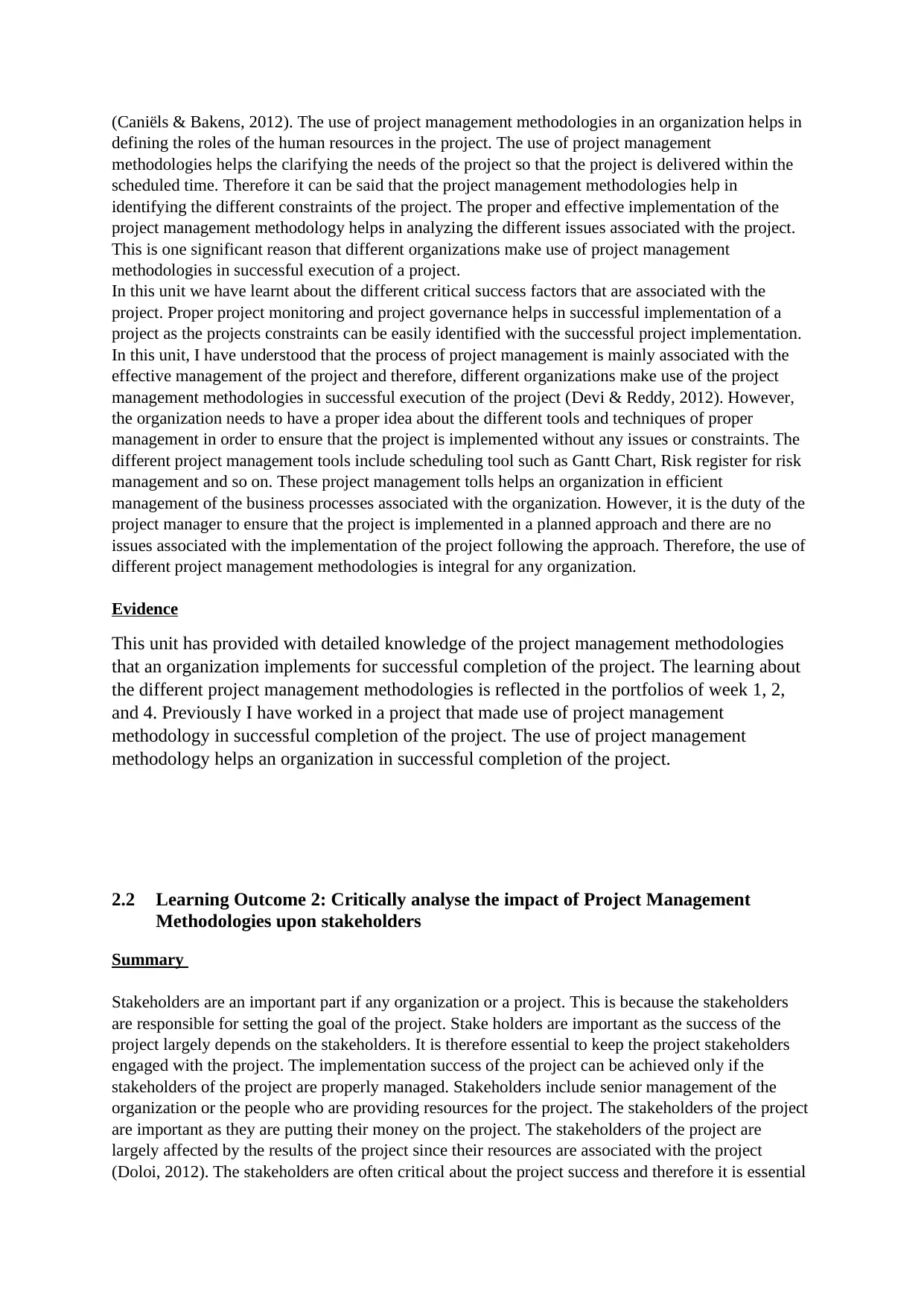
(Caniëls & Bakens, 2012). The use of project management methodologies in an organization helps in
defining the roles of the human resources in the project. The use of project management
methodologies helps the clarifying the needs of the project so that the project is delivered within the
scheduled time. Therefore it can be said that the project management methodologies help in
identifying the different constraints of the project. The proper and effective implementation of the
project management methodology helps in analyzing the different issues associated with the project.
This is one significant reason that different organizations make use of project management
methodologies in successful execution of a project.
In this unit we have learnt about the different critical success factors that are associated with the
project. Proper project monitoring and project governance helps in successful implementation of a
project as the projects constraints can be easily identified with the successful project implementation.
In this unit, I have understood that the process of project management is mainly associated with the
effective management of the project and therefore, different organizations make use of the project
management methodologies in successful execution of the project (Devi & Reddy, 2012). However,
the organization needs to have a proper idea about the different tools and techniques of proper
management in order to ensure that the project is implemented without any issues or constraints. The
different project management tools include scheduling tool such as Gantt Chart, Risk register for risk
management and so on. These project management tolls helps an organization in efficient
management of the business processes associated with the organization. However, it is the duty of the
project manager to ensure that the project is implemented in a planned approach and there are no
issues associated with the implementation of the project following the approach. Therefore, the use of
different project management methodologies is integral for any organization.
Evidence
This unit has provided with detailed knowledge of the project management methodologies
that an organization implements for successful completion of the project. The learning about
the different project management methodologies is reflected in the portfolios of week 1, 2,
and 4. Previously I have worked in a project that made use of project management
methodology in successful completion of the project. The use of project management
methodology helps an organization in successful completion of the project.
2.2 Learning Outcome 2: Critically analyse the impact of Project Management
Methodologies upon stakeholders
Summary
Stakeholders are an important part if any organization or a project. This is because the stakeholders
are responsible for setting the goal of the project. Stake holders are important as the success of the
project largely depends on the stakeholders. It is therefore essential to keep the project stakeholders
engaged with the project. The implementation success of the project can be achieved only if the
stakeholders of the project are properly managed. Stakeholders include senior management of the
organization or the people who are providing resources for the project. The stakeholders of the project
are important as they are putting their money on the project. The stakeholders of the project are
largely affected by the results of the project since their resources are associated with the project
(Doloi, 2012). The stakeholders are often critical about the project success and therefore it is essential
defining the roles of the human resources in the project. The use of project management
methodologies helps the clarifying the needs of the project so that the project is delivered within the
scheduled time. Therefore it can be said that the project management methodologies help in
identifying the different constraints of the project. The proper and effective implementation of the
project management methodology helps in analyzing the different issues associated with the project.
This is one significant reason that different organizations make use of project management
methodologies in successful execution of a project.
In this unit we have learnt about the different critical success factors that are associated with the
project. Proper project monitoring and project governance helps in successful implementation of a
project as the projects constraints can be easily identified with the successful project implementation.
In this unit, I have understood that the process of project management is mainly associated with the
effective management of the project and therefore, different organizations make use of the project
management methodologies in successful execution of the project (Devi & Reddy, 2012). However,
the organization needs to have a proper idea about the different tools and techniques of proper
management in order to ensure that the project is implemented without any issues or constraints. The
different project management tools include scheduling tool such as Gantt Chart, Risk register for risk
management and so on. These project management tolls helps an organization in efficient
management of the business processes associated with the organization. However, it is the duty of the
project manager to ensure that the project is implemented in a planned approach and there are no
issues associated with the implementation of the project following the approach. Therefore, the use of
different project management methodologies is integral for any organization.
Evidence
This unit has provided with detailed knowledge of the project management methodologies
that an organization implements for successful completion of the project. The learning about
the different project management methodologies is reflected in the portfolios of week 1, 2,
and 4. Previously I have worked in a project that made use of project management
methodology in successful completion of the project. The use of project management
methodology helps an organization in successful completion of the project.
2.2 Learning Outcome 2: Critically analyse the impact of Project Management
Methodologies upon stakeholders
Summary
Stakeholders are an important part if any organization or a project. This is because the stakeholders
are responsible for setting the goal of the project. Stake holders are important as the success of the
project largely depends on the stakeholders. It is therefore essential to keep the project stakeholders
engaged with the project. The implementation success of the project can be achieved only if the
stakeholders of the project are properly managed. Stakeholders include senior management of the
organization or the people who are providing resources for the project. The stakeholders of the project
are important as they are putting their money on the project. The stakeholders of the project are
largely affected by the results of the project since their resources are associated with the project
(Doloi, 2012). The stakeholders are often critical about the project success and therefore it is essential
Paraphrase This Document
Need a fresh take? Get an instant paraphrase of this document with our AI Paraphraser
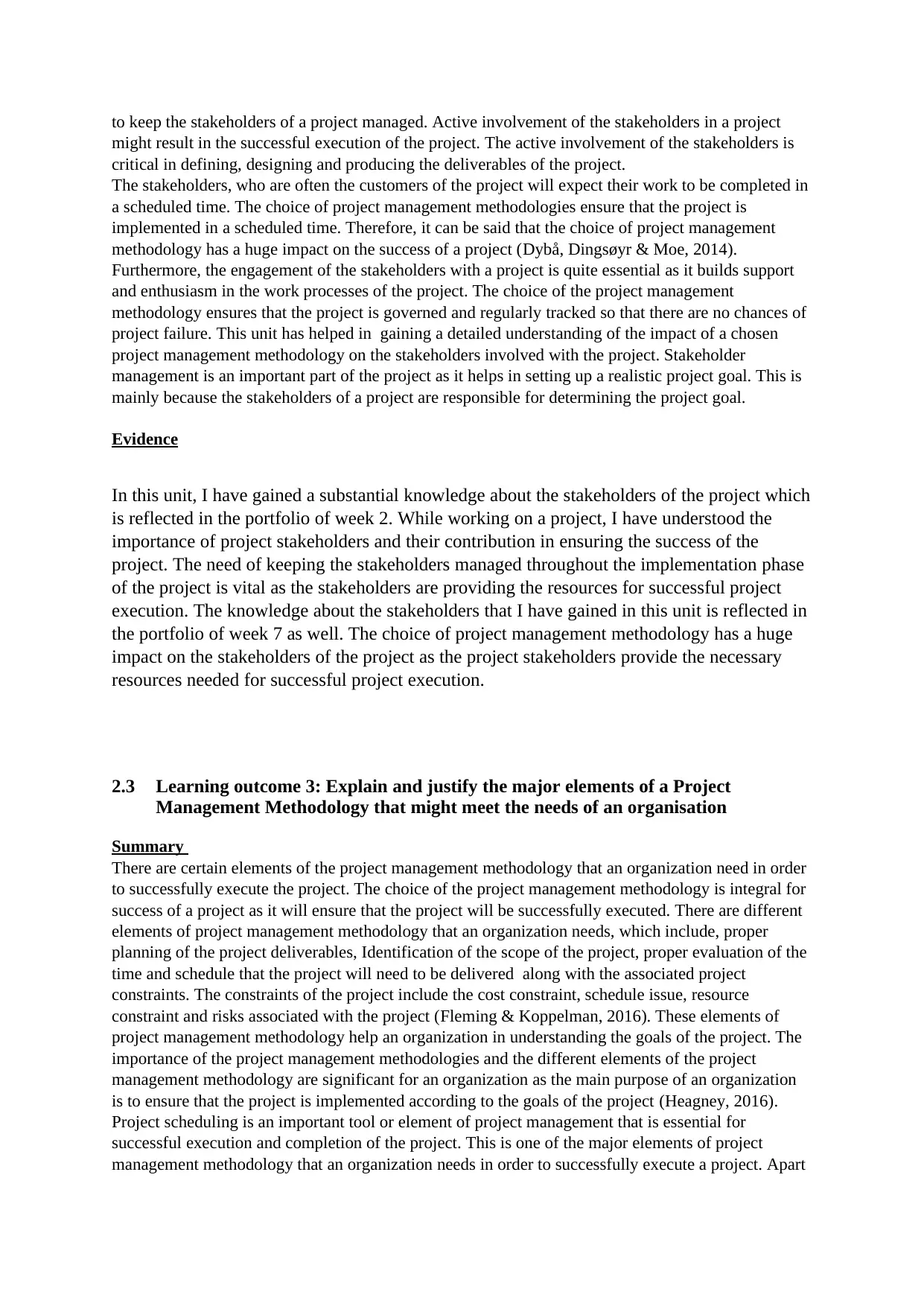
to keep the stakeholders of a project managed. Active involvement of the stakeholders in a project
might result in the successful execution of the project. The active involvement of the stakeholders is
critical in defining, designing and producing the deliverables of the project.
The stakeholders, who are often the customers of the project will expect their work to be completed in
a scheduled time. The choice of project management methodologies ensure that the project is
implemented in a scheduled time. Therefore, it can be said that the choice of project management
methodology has a huge impact on the success of a project (Dybå, Dingsøyr & Moe, 2014).
Furthermore, the engagement of the stakeholders with a project is quite essential as it builds support
and enthusiasm in the work processes of the project. The choice of the project management
methodology ensures that the project is governed and regularly tracked so that there are no chances of
project failure. This unit has helped in gaining a detailed understanding of the impact of a chosen
project management methodology on the stakeholders involved with the project. Stakeholder
management is an important part of the project as it helps in setting up a realistic project goal. This is
mainly because the stakeholders of a project are responsible for determining the project goal.
Evidence
In this unit, I have gained a substantial knowledge about the stakeholders of the project which
is reflected in the portfolio of week 2. While working on a project, I have understood the
importance of project stakeholders and their contribution in ensuring the success of the
project. The need of keeping the stakeholders managed throughout the implementation phase
of the project is vital as the stakeholders are providing the resources for successful project
execution. The knowledge about the stakeholders that I have gained in this unit is reflected in
the portfolio of week 7 as well. The choice of project management methodology has a huge
impact on the stakeholders of the project as the project stakeholders provide the necessary
resources needed for successful project execution.
2.3 Learning outcome 3: Explain and justify the major elements of a Project
Management Methodology that might meet the needs of an organisation
Summary
There are certain elements of the project management methodology that an organization need in order
to successfully execute the project. The choice of the project management methodology is integral for
success of a project as it will ensure that the project will be successfully executed. There are different
elements of project management methodology that an organization needs, which include, proper
planning of the project deliverables, Identification of the scope of the project, proper evaluation of the
time and schedule that the project will need to be delivered along with the associated project
constraints. The constraints of the project include the cost constraint, schedule issue, resource
constraint and risks associated with the project (Fleming & Koppelman, 2016). These elements of
project management methodology help an organization in understanding the goals of the project. The
importance of the project management methodologies and the different elements of the project
management methodology are significant for an organization as the main purpose of an organization
is to ensure that the project is implemented according to the goals of the project (Heagney, 2016).
Project scheduling is an important tool or element of project management that is essential for
successful execution and completion of the project. This is one of the major elements of project
management methodology that an organization needs in order to successfully execute a project. Apart
might result in the successful execution of the project. The active involvement of the stakeholders is
critical in defining, designing and producing the deliverables of the project.
The stakeholders, who are often the customers of the project will expect their work to be completed in
a scheduled time. The choice of project management methodologies ensure that the project is
implemented in a scheduled time. Therefore, it can be said that the choice of project management
methodology has a huge impact on the success of a project (Dybå, Dingsøyr & Moe, 2014).
Furthermore, the engagement of the stakeholders with a project is quite essential as it builds support
and enthusiasm in the work processes of the project. The choice of the project management
methodology ensures that the project is governed and regularly tracked so that there are no chances of
project failure. This unit has helped in gaining a detailed understanding of the impact of a chosen
project management methodology on the stakeholders involved with the project. Stakeholder
management is an important part of the project as it helps in setting up a realistic project goal. This is
mainly because the stakeholders of a project are responsible for determining the project goal.
Evidence
In this unit, I have gained a substantial knowledge about the stakeholders of the project which
is reflected in the portfolio of week 2. While working on a project, I have understood the
importance of project stakeholders and their contribution in ensuring the success of the
project. The need of keeping the stakeholders managed throughout the implementation phase
of the project is vital as the stakeholders are providing the resources for successful project
execution. The knowledge about the stakeholders that I have gained in this unit is reflected in
the portfolio of week 7 as well. The choice of project management methodology has a huge
impact on the stakeholders of the project as the project stakeholders provide the necessary
resources needed for successful project execution.
2.3 Learning outcome 3: Explain and justify the major elements of a Project
Management Methodology that might meet the needs of an organisation
Summary
There are certain elements of the project management methodology that an organization need in order
to successfully execute the project. The choice of the project management methodology is integral for
success of a project as it will ensure that the project will be successfully executed. There are different
elements of project management methodology that an organization needs, which include, proper
planning of the project deliverables, Identification of the scope of the project, proper evaluation of the
time and schedule that the project will need to be delivered along with the associated project
constraints. The constraints of the project include the cost constraint, schedule issue, resource
constraint and risks associated with the project (Fleming & Koppelman, 2016). These elements of
project management methodology help an organization in understanding the goals of the project. The
importance of the project management methodologies and the different elements of the project
management methodology are significant for an organization as the main purpose of an organization
is to ensure that the project is implemented according to the goals of the project (Heagney, 2016).
Project scheduling is an important tool or element of project management that is essential for
successful execution and completion of the project. This is one of the major elements of project
management methodology that an organization needs in order to successfully execute a project. Apart
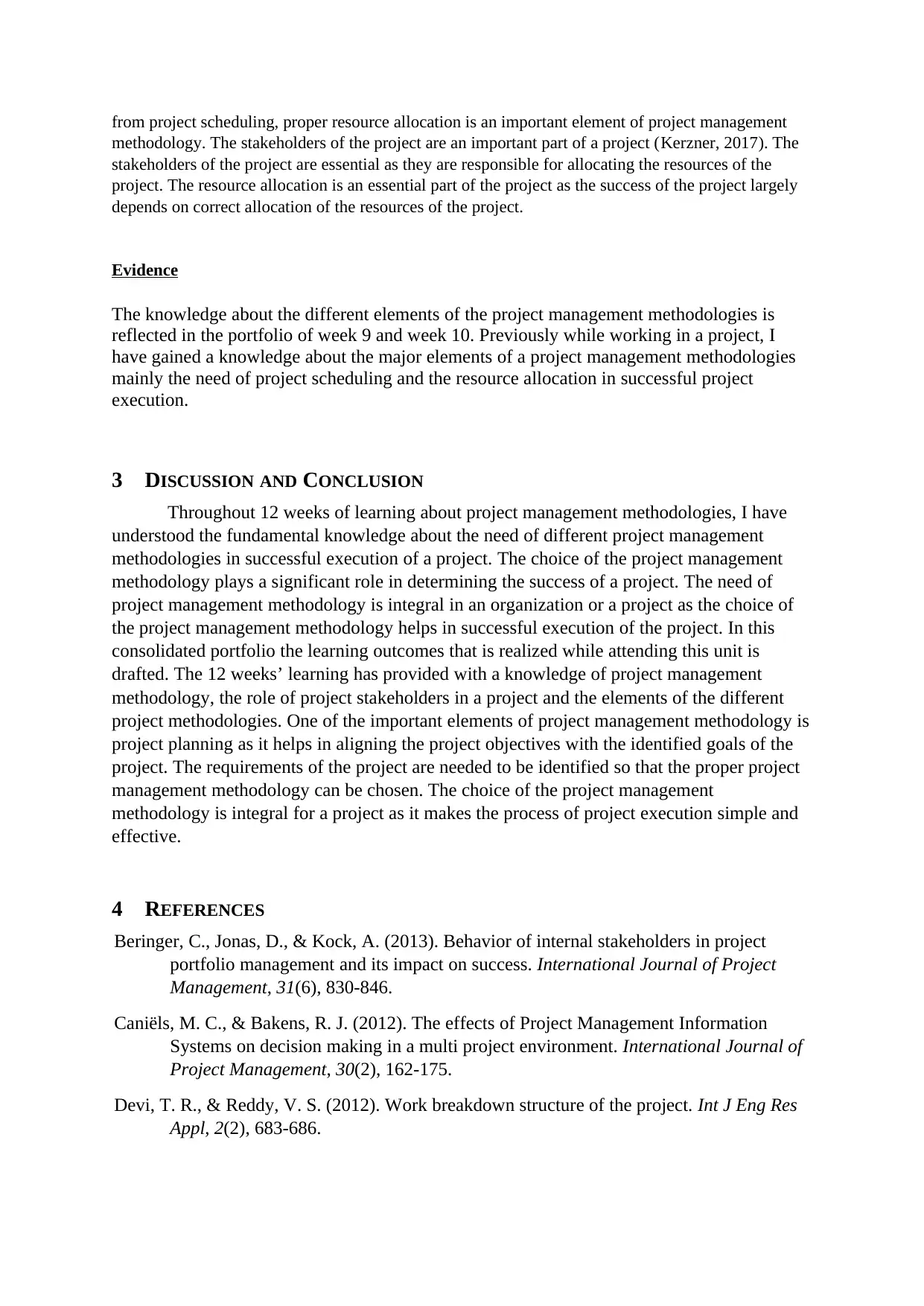
from project scheduling, proper resource allocation is an important element of project management
methodology. The stakeholders of the project are an important part of a project (Kerzner, 2017). The
stakeholders of the project are essential as they are responsible for allocating the resources of the
project. The resource allocation is an essential part of the project as the success of the project largely
depends on correct allocation of the resources of the project.
Evidence
The knowledge about the different elements of the project management methodologies is
reflected in the portfolio of week 9 and week 10. Previously while working in a project, I
have gained a knowledge about the major elements of a project management methodologies
mainly the need of project scheduling and the resource allocation in successful project
execution.
3 DISCUSSION AND CONCLUSION
Throughout 12 weeks of learning about project management methodologies, I have
understood the fundamental knowledge about the need of different project management
methodologies in successful execution of a project. The choice of the project management
methodology plays a significant role in determining the success of a project. The need of
project management methodology is integral in an organization or a project as the choice of
the project management methodology helps in successful execution of the project. In this
consolidated portfolio the learning outcomes that is realized while attending this unit is
drafted. The 12 weeks’ learning has provided with a knowledge of project management
methodology, the role of project stakeholders in a project and the elements of the different
project methodologies. One of the important elements of project management methodology is
project planning as it helps in aligning the project objectives with the identified goals of the
project. The requirements of the project are needed to be identified so that the proper project
management methodology can be chosen. The choice of the project management
methodology is integral for a project as it makes the process of project execution simple and
effective.
4 REFERENCES
Beringer, C., Jonas, D., & Kock, A. (2013). Behavior of internal stakeholders in project
portfolio management and its impact on success. International Journal of Project
Management, 31(6), 830-846.
Caniëls, M. C., & Bakens, R. J. (2012). The effects of Project Management Information
Systems on decision making in a multi project environment. International Journal of
Project Management, 30(2), 162-175.
Devi, T. R., & Reddy, V. S. (2012). Work breakdown structure of the project. Int J Eng Res
Appl, 2(2), 683-686.
methodology. The stakeholders of the project are an important part of a project (Kerzner, 2017). The
stakeholders of the project are essential as they are responsible for allocating the resources of the
project. The resource allocation is an essential part of the project as the success of the project largely
depends on correct allocation of the resources of the project.
Evidence
The knowledge about the different elements of the project management methodologies is
reflected in the portfolio of week 9 and week 10. Previously while working in a project, I
have gained a knowledge about the major elements of a project management methodologies
mainly the need of project scheduling and the resource allocation in successful project
execution.
3 DISCUSSION AND CONCLUSION
Throughout 12 weeks of learning about project management methodologies, I have
understood the fundamental knowledge about the need of different project management
methodologies in successful execution of a project. The choice of the project management
methodology plays a significant role in determining the success of a project. The need of
project management methodology is integral in an organization or a project as the choice of
the project management methodology helps in successful execution of the project. In this
consolidated portfolio the learning outcomes that is realized while attending this unit is
drafted. The 12 weeks’ learning has provided with a knowledge of project management
methodology, the role of project stakeholders in a project and the elements of the different
project methodologies. One of the important elements of project management methodology is
project planning as it helps in aligning the project objectives with the identified goals of the
project. The requirements of the project are needed to be identified so that the proper project
management methodology can be chosen. The choice of the project management
methodology is integral for a project as it makes the process of project execution simple and
effective.
4 REFERENCES
Beringer, C., Jonas, D., & Kock, A. (2013). Behavior of internal stakeholders in project
portfolio management and its impact on success. International Journal of Project
Management, 31(6), 830-846.
Caniëls, M. C., & Bakens, R. J. (2012). The effects of Project Management Information
Systems on decision making in a multi project environment. International Journal of
Project Management, 30(2), 162-175.
Devi, T. R., & Reddy, V. S. (2012). Work breakdown structure of the project. Int J Eng Res
Appl, 2(2), 683-686.
⊘ This is a preview!⊘
Do you want full access?
Subscribe today to unlock all pages.

Trusted by 1+ million students worldwide
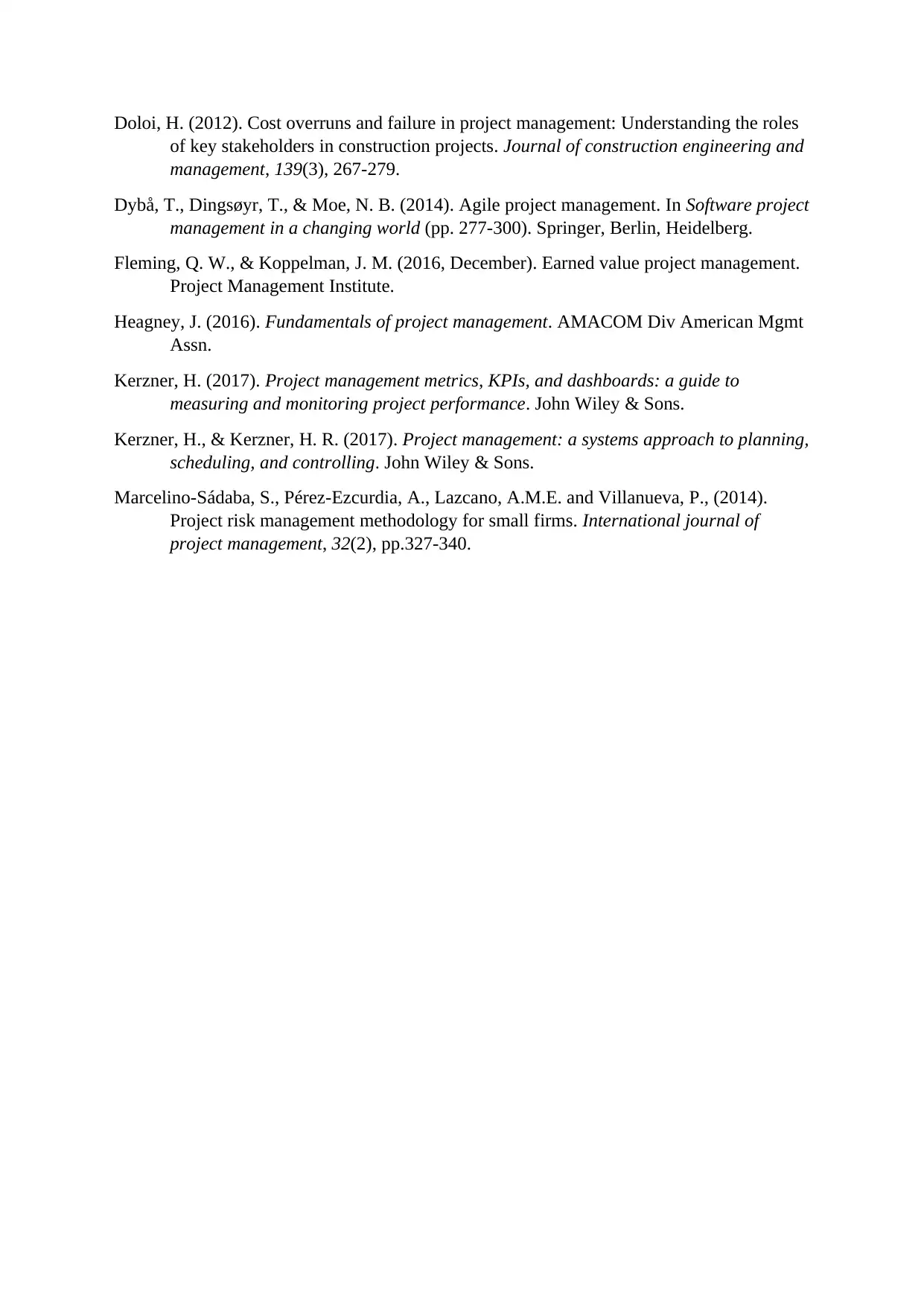
Doloi, H. (2012). Cost overruns and failure in project management: Understanding the roles
of key stakeholders in construction projects. Journal of construction engineering and
management, 139(3), 267-279.
Dybå, T., Dingsøyr, T., & Moe, N. B. (2014). Agile project management. In Software project
management in a changing world (pp. 277-300). Springer, Berlin, Heidelberg.
Fleming, Q. W., & Koppelman, J. M. (2016, December). Earned value project management.
Project Management Institute.
Heagney, J. (2016). Fundamentals of project management. AMACOM Div American Mgmt
Assn.
Kerzner, H. (2017). Project management metrics, KPIs, and dashboards: a guide to
measuring and monitoring project performance. John Wiley & Sons.
Kerzner, H., & Kerzner, H. R. (2017). Project management: a systems approach to planning,
scheduling, and controlling. John Wiley & Sons.
Marcelino-Sádaba, S., Pérez-Ezcurdia, A., Lazcano, A.M.E. and Villanueva, P., (2014).
Project risk management methodology for small firms. International journal of
project management, 32(2), pp.327-340.
of key stakeholders in construction projects. Journal of construction engineering and
management, 139(3), 267-279.
Dybå, T., Dingsøyr, T., & Moe, N. B. (2014). Agile project management. In Software project
management in a changing world (pp. 277-300). Springer, Berlin, Heidelberg.
Fleming, Q. W., & Koppelman, J. M. (2016, December). Earned value project management.
Project Management Institute.
Heagney, J. (2016). Fundamentals of project management. AMACOM Div American Mgmt
Assn.
Kerzner, H. (2017). Project management metrics, KPIs, and dashboards: a guide to
measuring and monitoring project performance. John Wiley & Sons.
Kerzner, H., & Kerzner, H. R. (2017). Project management: a systems approach to planning,
scheduling, and controlling. John Wiley & Sons.
Marcelino-Sádaba, S., Pérez-Ezcurdia, A., Lazcano, A.M.E. and Villanueva, P., (2014).
Project risk management methodology for small firms. International journal of
project management, 32(2), pp.327-340.
Paraphrase This Document
Need a fresh take? Get an instant paraphrase of this document with our AI Paraphraser
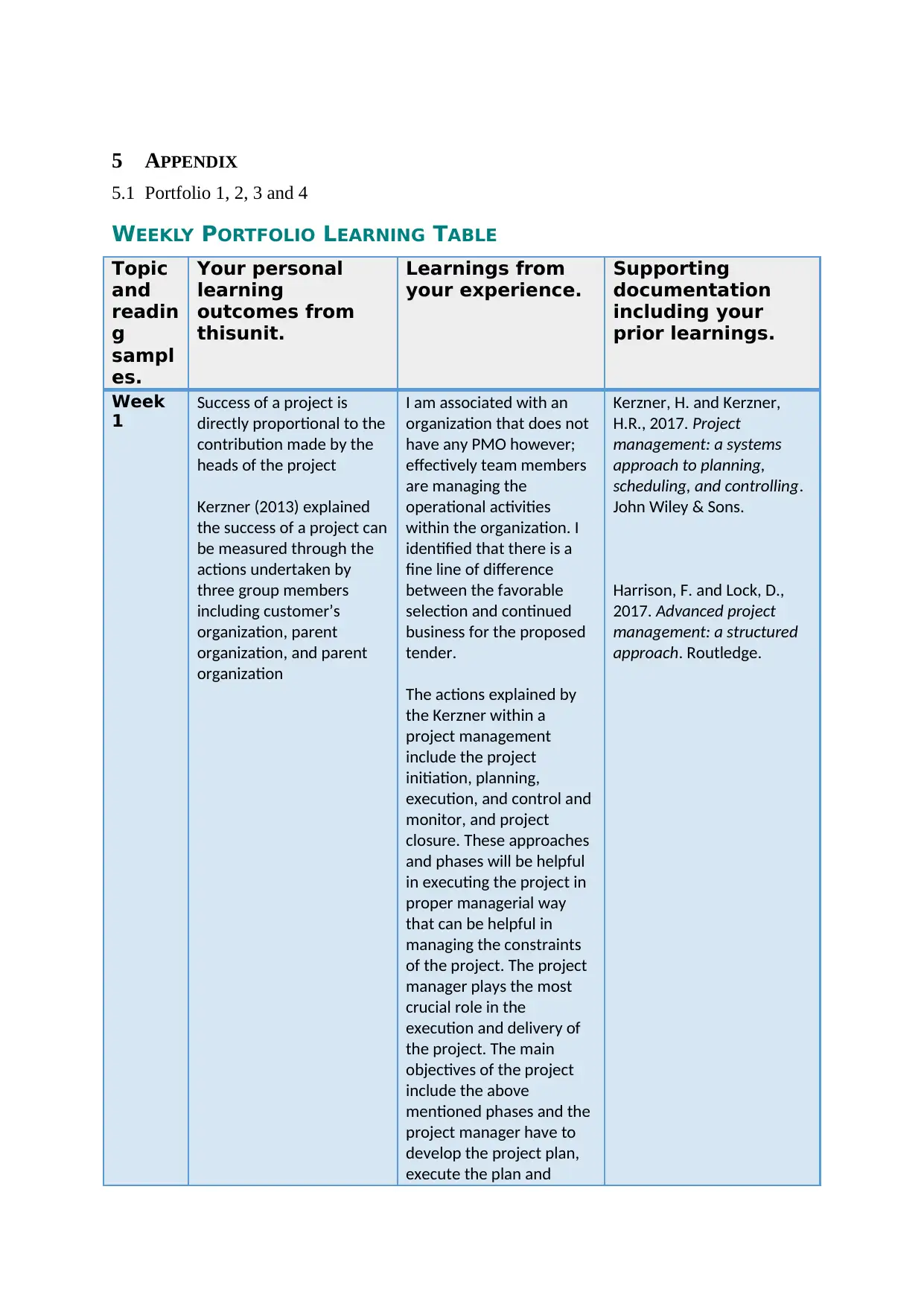
5 APPENDIX
5.1 Portfolio 1, 2, 3 and 4
WEEKLY PORTFOLIO LEARNING TABLE
Topic
and
readin
g
sampl
es.
Your personal
learning
outcomes from
thisunit.
Learnings from
your experience.
Supporting
documentation
including your
prior learnings.
Week
1
Success of a project is
directly proportional to the
contribution made by the
heads of the project
Kerzner (2013) explained
the success of a project can
be measured through the
actions undertaken by
three group members
including customer’s
organization, parent
organization, and parent
organization
I am associated with an
organization that does not
have any PMO however;
effectively team members
are managing the
operational activities
within the organization. I
identified that there is a
fine line of difference
between the favorable
selection and continued
business for the proposed
tender.
The actions explained by
the Kerzner within a
project management
include the project
initiation, planning,
execution, and control and
monitor, and project
closure. These approaches
and phases will be helpful
in executing the project in
proper managerial way
that can be helpful in
managing the constraints
of the project. The project
manager plays the most
crucial role in the
execution and delivery of
the project. The main
objectives of the project
include the above
mentioned phases and the
project manager have to
develop the project plan,
execute the plan and
Kerzner, H. and Kerzner,
H.R., 2017. Project
management: a systems
approach to planning,
scheduling, and controlling.
John Wiley & Sons.
Harrison, F. and Lock, D.,
2017. Advanced project
management: a structured
approach. Routledge.
5.1 Portfolio 1, 2, 3 and 4
WEEKLY PORTFOLIO LEARNING TABLE
Topic
and
readin
g
sampl
es.
Your personal
learning
outcomes from
thisunit.
Learnings from
your experience.
Supporting
documentation
including your
prior learnings.
Week
1
Success of a project is
directly proportional to the
contribution made by the
heads of the project
Kerzner (2013) explained
the success of a project can
be measured through the
actions undertaken by
three group members
including customer’s
organization, parent
organization, and parent
organization
I am associated with an
organization that does not
have any PMO however;
effectively team members
are managing the
operational activities
within the organization. I
identified that there is a
fine line of difference
between the favorable
selection and continued
business for the proposed
tender.
The actions explained by
the Kerzner within a
project management
include the project
initiation, planning,
execution, and control and
monitor, and project
closure. These approaches
and phases will be helpful
in executing the project in
proper managerial way
that can be helpful in
managing the constraints
of the project. The project
manager plays the most
crucial role in the
execution and delivery of
the project. The main
objectives of the project
include the above
mentioned phases and the
project manager have to
develop the project plan,
execute the plan and
Kerzner, H. and Kerzner,
H.R., 2017. Project
management: a systems
approach to planning,
scheduling, and controlling.
John Wiley & Sons.
Harrison, F. and Lock, D.,
2017. Advanced project
management: a structured
approach. Routledge.
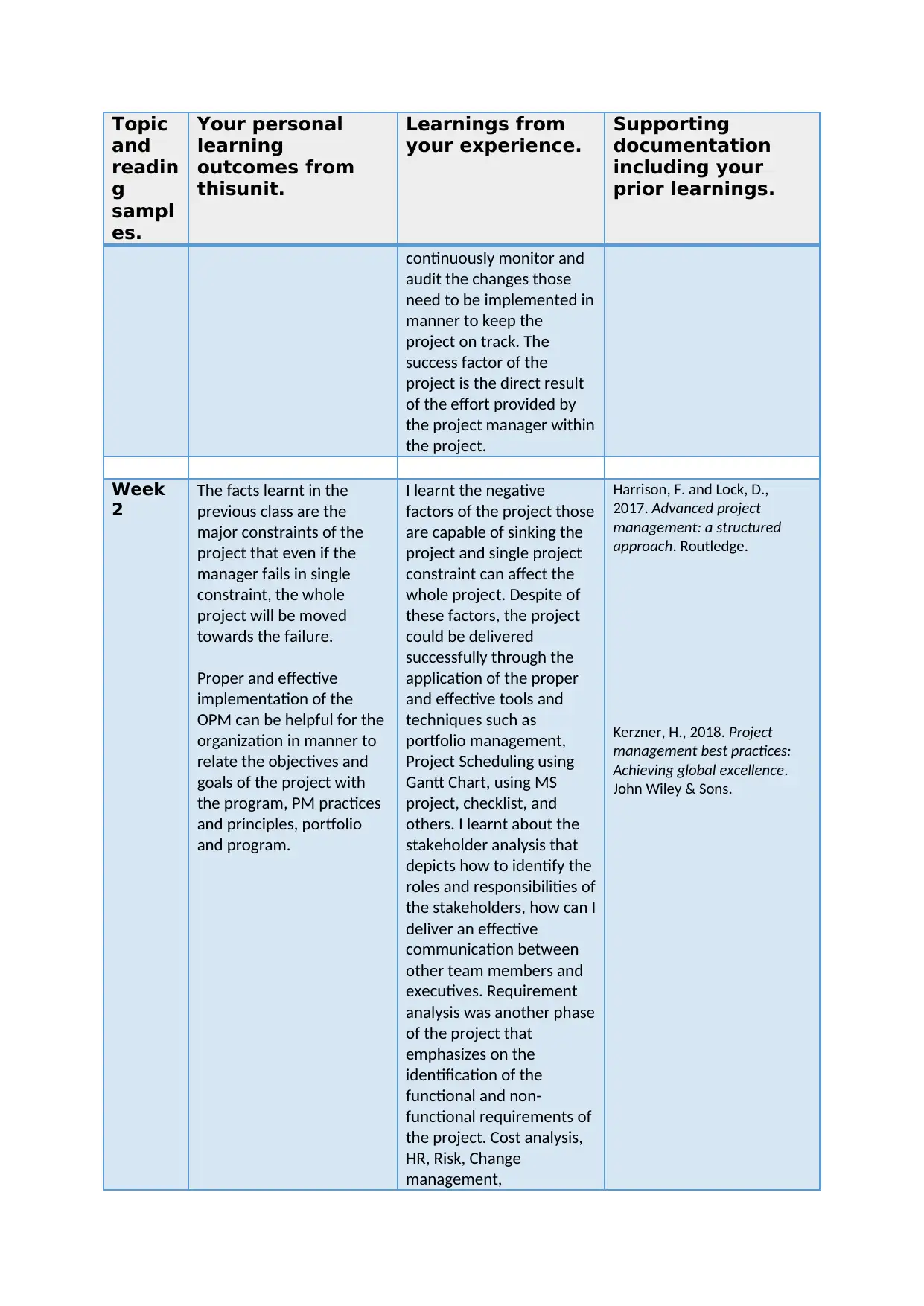
Topic
and
readin
g
sampl
es.
Your personal
learning
outcomes from
thisunit.
Learnings from
your experience.
Supporting
documentation
including your
prior learnings.
continuously monitor and
audit the changes those
need to be implemented in
manner to keep the
project on track. The
success factor of the
project is the direct result
of the effort provided by
the project manager within
the project.
Week
2
The facts learnt in the
previous class are the
major constraints of the
project that even if the
manager fails in single
constraint, the whole
project will be moved
towards the failure.
Proper and effective
implementation of the
OPM can be helpful for the
organization in manner to
relate the objectives and
goals of the project with
the program, PM practices
and principles, portfolio
and program.
I learnt the negative
factors of the project those
are capable of sinking the
project and single project
constraint can affect the
whole project. Despite of
these factors, the project
could be delivered
successfully through the
application of the proper
and effective tools and
techniques such as
portfolio management,
Project Scheduling using
Gantt Chart, using MS
project, checklist, and
others. I learnt about the
stakeholder analysis that
depicts how to identify the
roles and responsibilities of
the stakeholders, how can I
deliver an effective
communication between
other team members and
executives. Requirement
analysis was another phase
of the project that
emphasizes on the
identification of the
functional and non-
functional requirements of
the project. Cost analysis,
HR, Risk, Change
management,
Harrison, F. and Lock, D.,
2017. Advanced project
management: a structured
approach. Routledge.
Kerzner, H., 2018. Project
management best practices:
Achieving global excellence.
John Wiley & Sons.
and
readin
g
sampl
es.
Your personal
learning
outcomes from
thisunit.
Learnings from
your experience.
Supporting
documentation
including your
prior learnings.
continuously monitor and
audit the changes those
need to be implemented in
manner to keep the
project on track. The
success factor of the
project is the direct result
of the effort provided by
the project manager within
the project.
Week
2
The facts learnt in the
previous class are the
major constraints of the
project that even if the
manager fails in single
constraint, the whole
project will be moved
towards the failure.
Proper and effective
implementation of the
OPM can be helpful for the
organization in manner to
relate the objectives and
goals of the project with
the program, PM practices
and principles, portfolio
and program.
I learnt the negative
factors of the project those
are capable of sinking the
project and single project
constraint can affect the
whole project. Despite of
these factors, the project
could be delivered
successfully through the
application of the proper
and effective tools and
techniques such as
portfolio management,
Project Scheduling using
Gantt Chart, using MS
project, checklist, and
others. I learnt about the
stakeholder analysis that
depicts how to identify the
roles and responsibilities of
the stakeholders, how can I
deliver an effective
communication between
other team members and
executives. Requirement
analysis was another phase
of the project that
emphasizes on the
identification of the
functional and non-
functional requirements of
the project. Cost analysis,
HR, Risk, Change
management,
Harrison, F. and Lock, D.,
2017. Advanced project
management: a structured
approach. Routledge.
Kerzner, H., 2018. Project
management best practices:
Achieving global excellence.
John Wiley & Sons.
⊘ This is a preview!⊘
Do you want full access?
Subscribe today to unlock all pages.

Trusted by 1+ million students worldwide
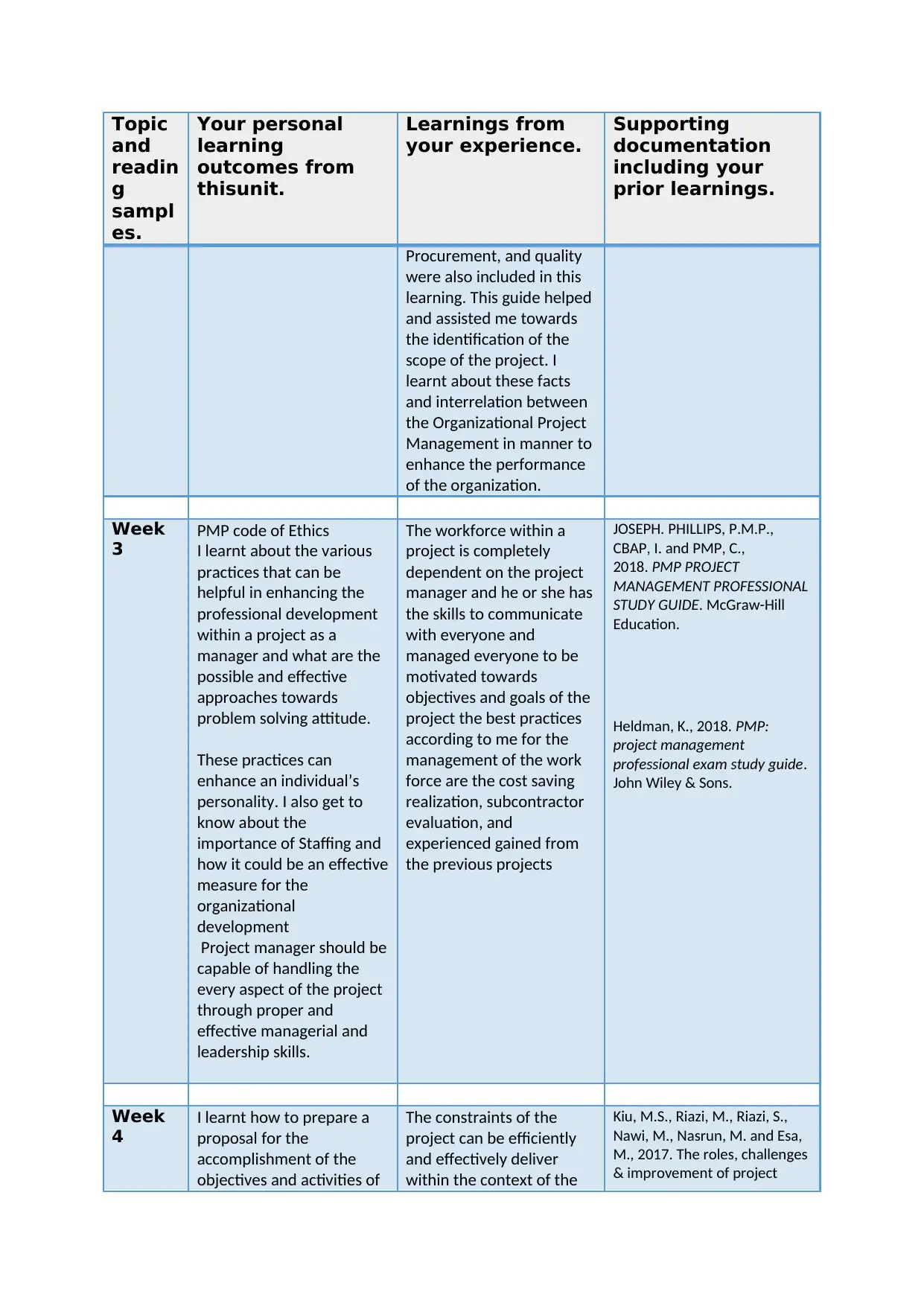
Topic
and
readin
g
sampl
es.
Your personal
learning
outcomes from
thisunit.
Learnings from
your experience.
Supporting
documentation
including your
prior learnings.
Procurement, and quality
were also included in this
learning. This guide helped
and assisted me towards
the identification of the
scope of the project. I
learnt about these facts
and interrelation between
the Organizational Project
Management in manner to
enhance the performance
of the organization.
Week
3
PMP code of Ethics
I learnt about the various
practices that can be
helpful in enhancing the
professional development
within a project as a
manager and what are the
possible and effective
approaches towards
problem solving attitude.
These practices can
enhance an individual’s
personality. I also get to
know about the
importance of Staffing and
how it could be an effective
measure for the
organizational
development
Project manager should be
capable of handling the
every aspect of the project
through proper and
effective managerial and
leadership skills.
The workforce within a
project is completely
dependent on the project
manager and he or she has
the skills to communicate
with everyone and
managed everyone to be
motivated towards
objectives and goals of the
project the best practices
according to me for the
management of the work
force are the cost saving
realization, subcontractor
evaluation, and
experienced gained from
the previous projects
JOSEPH. PHILLIPS, P.M.P.,
CBAP, I. and PMP, C.,
2018. PMP PROJECT
MANAGEMENT PROFESSIONAL
STUDY GUIDE. McGraw-Hill
Education.
Heldman, K., 2018. PMP:
project management
professional exam study guide.
John Wiley & Sons.
Week
4
I learnt how to prepare a
proposal for the
accomplishment of the
objectives and activities of
The constraints of the
project can be efficiently
and effectively deliver
within the context of the
Kiu, M.S., Riazi, M., Riazi, S.,
Nawi, M., Nasrun, M. and Esa,
M., 2017. The roles, challenges
& improvement of project
and
readin
g
sampl
es.
Your personal
learning
outcomes from
thisunit.
Learnings from
your experience.
Supporting
documentation
including your
prior learnings.
Procurement, and quality
were also included in this
learning. This guide helped
and assisted me towards
the identification of the
scope of the project. I
learnt about these facts
and interrelation between
the Organizational Project
Management in manner to
enhance the performance
of the organization.
Week
3
PMP code of Ethics
I learnt about the various
practices that can be
helpful in enhancing the
professional development
within a project as a
manager and what are the
possible and effective
approaches towards
problem solving attitude.
These practices can
enhance an individual’s
personality. I also get to
know about the
importance of Staffing and
how it could be an effective
measure for the
organizational
development
Project manager should be
capable of handling the
every aspect of the project
through proper and
effective managerial and
leadership skills.
The workforce within a
project is completely
dependent on the project
manager and he or she has
the skills to communicate
with everyone and
managed everyone to be
motivated towards
objectives and goals of the
project the best practices
according to me for the
management of the work
force are the cost saving
realization, subcontractor
evaluation, and
experienced gained from
the previous projects
JOSEPH. PHILLIPS, P.M.P.,
CBAP, I. and PMP, C.,
2018. PMP PROJECT
MANAGEMENT PROFESSIONAL
STUDY GUIDE. McGraw-Hill
Education.
Heldman, K., 2018. PMP:
project management
professional exam study guide.
John Wiley & Sons.
Week
4
I learnt how to prepare a
proposal for the
accomplishment of the
objectives and activities of
The constraints of the
project can be efficiently
and effectively deliver
within the context of the
Kiu, M.S., Riazi, M., Riazi, S.,
Nawi, M., Nasrun, M. and Esa,
M., 2017. The roles, challenges
& improvement of project
Paraphrase This Document
Need a fresh take? Get an instant paraphrase of this document with our AI Paraphraser
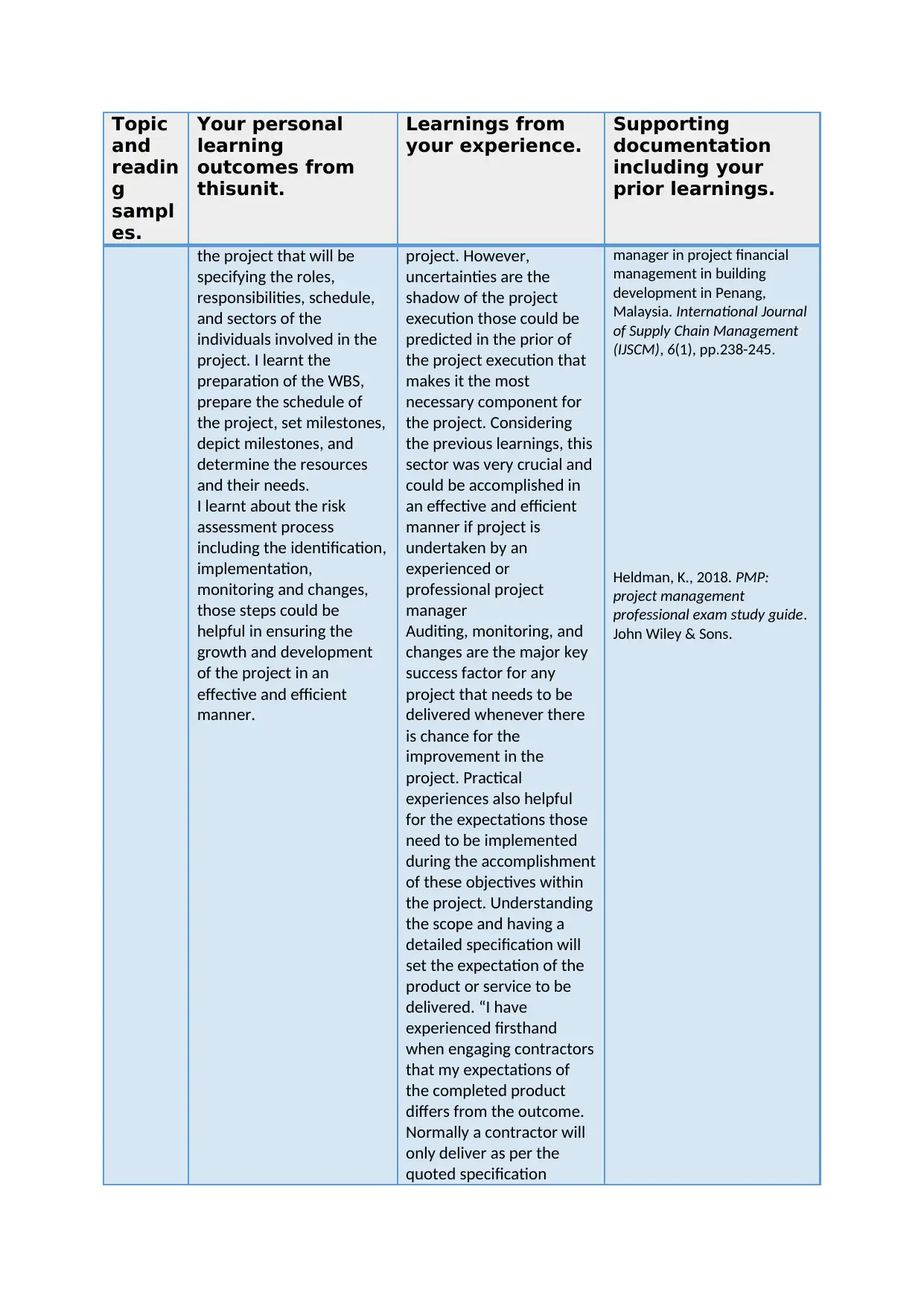
Topic
and
readin
g
sampl
es.
Your personal
learning
outcomes from
thisunit.
Learnings from
your experience.
Supporting
documentation
including your
prior learnings.
the project that will be
specifying the roles,
responsibilities, schedule,
and sectors of the
individuals involved in the
project. I learnt the
preparation of the WBS,
prepare the schedule of
the project, set milestones,
depict milestones, and
determine the resources
and their needs.
I learnt about the risk
assessment process
including the identification,
implementation,
monitoring and changes,
those steps could be
helpful in ensuring the
growth and development
of the project in an
effective and efficient
manner.
project. However,
uncertainties are the
shadow of the project
execution those could be
predicted in the prior of
the project execution that
makes it the most
necessary component for
the project. Considering
the previous learnings, this
sector was very crucial and
could be accomplished in
an effective and efficient
manner if project is
undertaken by an
experienced or
professional project
manager
Auditing, monitoring, and
changes are the major key
success factor for any
project that needs to be
delivered whenever there
is chance for the
improvement in the
project. Practical
experiences also helpful
for the expectations those
need to be implemented
during the accomplishment
of these objectives within
the project. Understanding
the scope and having a
detailed specification will
set the expectation of the
product or service to be
delivered. “I have
experienced firsthand
when engaging contractors
that my expectations of
the completed product
differs from the outcome.
Normally a contractor will
only deliver as per the
quoted specification
manager in project financial
management in building
development in Penang,
Malaysia. International Journal
of Supply Chain Management
(IJSCM), 6(1), pp.238-245.
Heldman, K., 2018. PMP:
project management
professional exam study guide.
John Wiley & Sons.
and
readin
g
sampl
es.
Your personal
learning
outcomes from
thisunit.
Learnings from
your experience.
Supporting
documentation
including your
prior learnings.
the project that will be
specifying the roles,
responsibilities, schedule,
and sectors of the
individuals involved in the
project. I learnt the
preparation of the WBS,
prepare the schedule of
the project, set milestones,
depict milestones, and
determine the resources
and their needs.
I learnt about the risk
assessment process
including the identification,
implementation,
monitoring and changes,
those steps could be
helpful in ensuring the
growth and development
of the project in an
effective and efficient
manner.
project. However,
uncertainties are the
shadow of the project
execution those could be
predicted in the prior of
the project execution that
makes it the most
necessary component for
the project. Considering
the previous learnings, this
sector was very crucial and
could be accomplished in
an effective and efficient
manner if project is
undertaken by an
experienced or
professional project
manager
Auditing, monitoring, and
changes are the major key
success factor for any
project that needs to be
delivered whenever there
is chance for the
improvement in the
project. Practical
experiences also helpful
for the expectations those
need to be implemented
during the accomplishment
of these objectives within
the project. Understanding
the scope and having a
detailed specification will
set the expectation of the
product or service to be
delivered. “I have
experienced firsthand
when engaging contractors
that my expectations of
the completed product
differs from the outcome.
Normally a contractor will
only deliver as per the
quoted specification
manager in project financial
management in building
development in Penang,
Malaysia. International Journal
of Supply Chain Management
(IJSCM), 6(1), pp.238-245.
Heldman, K., 2018. PMP:
project management
professional exam study guide.
John Wiley & Sons.
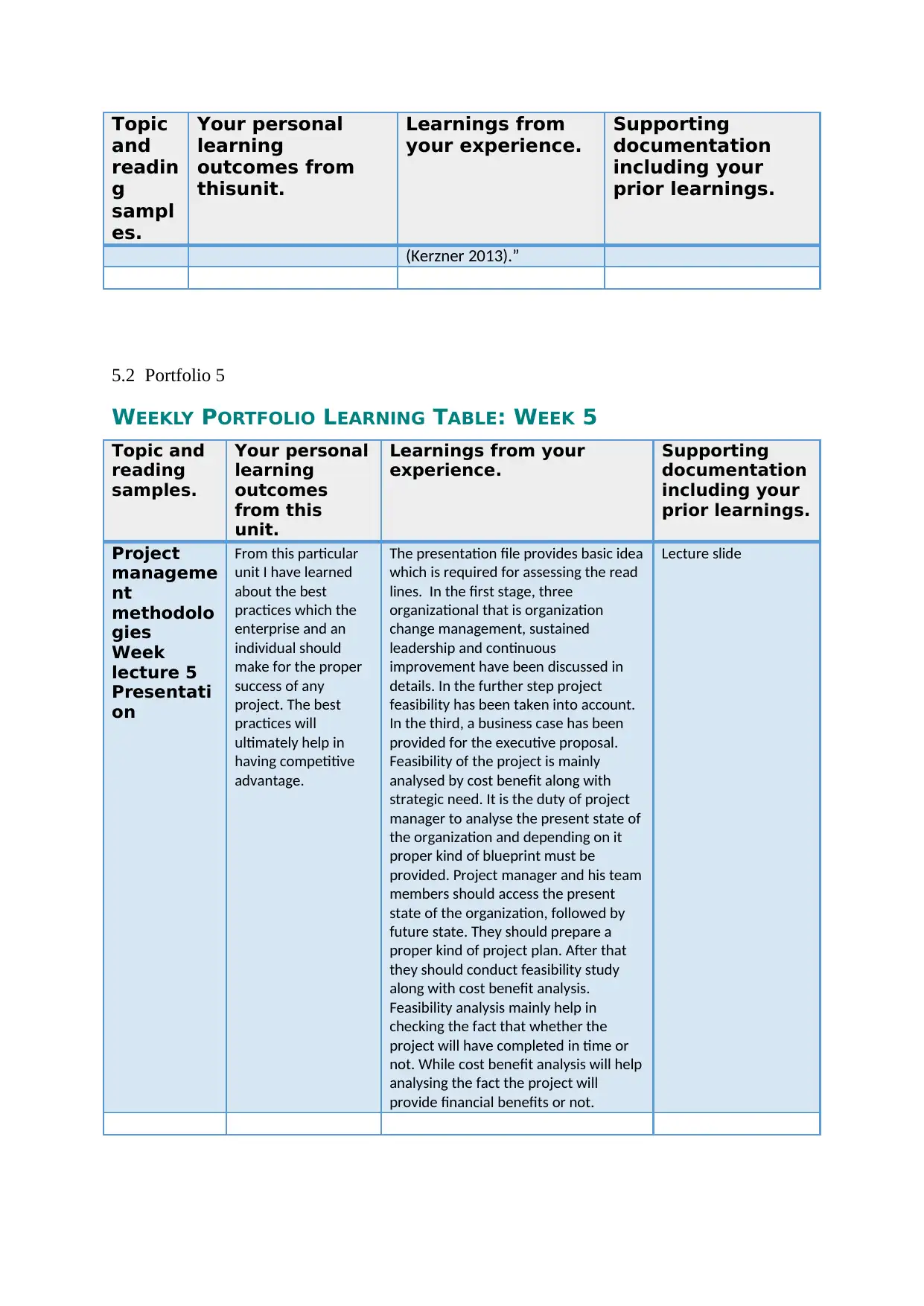
Topic
and
readin
g
sampl
es.
Your personal
learning
outcomes from
thisunit.
Learnings from
your experience.
Supporting
documentation
including your
prior learnings.
(Kerzner 2013).”
5.2 Portfolio 5
WEEKLY PORTFOLIO LEARNING TABLE: WEEK 5
Topic and
reading
samples.
Your personal
learning
outcomes
from this
unit.
Learnings from your
experience.
Supporting
documentation
including your
prior learnings.
Project
manageme
nt
methodolo
gies
Week
lecture 5
Presentati
on
From this particular
unit I have learned
about the best
practices which the
enterprise and an
individual should
make for the proper
success of any
project. The best
practices will
ultimately help in
having competitive
advantage.
The presentation file provides basic idea
which is required for assessing the read
lines. In the first stage, three
organizational that is organization
change management, sustained
leadership and continuous
improvement have been discussed in
details. In the further step project
feasibility has been taken into account.
In the third, a business case has been
provided for the executive proposal.
Feasibility of the project is mainly
analysed by cost benefit along with
strategic need. It is the duty of project
manager to analyse the present state of
the organization and depending on it
proper kind of blueprint must be
provided. Project manager and his team
members should access the present
state of the organization, followed by
future state. They should prepare a
proper kind of project plan. After that
they should conduct feasibility study
along with cost benefit analysis.
Feasibility analysis mainly help in
checking the fact that whether the
project will have completed in time or
not. While cost benefit analysis will help
analysing the fact the project will
provide financial benefits or not.
Lecture slide
and
readin
g
sampl
es.
Your personal
learning
outcomes from
thisunit.
Learnings from
your experience.
Supporting
documentation
including your
prior learnings.
(Kerzner 2013).”
5.2 Portfolio 5
WEEKLY PORTFOLIO LEARNING TABLE: WEEK 5
Topic and
reading
samples.
Your personal
learning
outcomes
from this
unit.
Learnings from your
experience.
Supporting
documentation
including your
prior learnings.
Project
manageme
nt
methodolo
gies
Week
lecture 5
Presentati
on
From this particular
unit I have learned
about the best
practices which the
enterprise and an
individual should
make for the proper
success of any
project. The best
practices will
ultimately help in
having competitive
advantage.
The presentation file provides basic idea
which is required for assessing the read
lines. In the first stage, three
organizational that is organization
change management, sustained
leadership and continuous
improvement have been discussed in
details. In the further step project
feasibility has been taken into account.
In the third, a business case has been
provided for the executive proposal.
Feasibility of the project is mainly
analysed by cost benefit along with
strategic need. It is the duty of project
manager to analyse the present state of
the organization and depending on it
proper kind of blueprint must be
provided. Project manager and his team
members should access the present
state of the organization, followed by
future state. They should prepare a
proper kind of project plan. After that
they should conduct feasibility study
along with cost benefit analysis.
Feasibility analysis mainly help in
checking the fact that whether the
project will have completed in time or
not. While cost benefit analysis will help
analysing the fact the project will
provide financial benefits or not.
Lecture slide
⊘ This is a preview!⊘
Do you want full access?
Subscribe today to unlock all pages.

Trusted by 1+ million students worldwide
1 out of 46
Related Documents
Your All-in-One AI-Powered Toolkit for Academic Success.
+13062052269
info@desklib.com
Available 24*7 on WhatsApp / Email
![[object Object]](/_next/static/media/star-bottom.7253800d.svg)
Unlock your academic potential
Copyright © 2020–2025 A2Z Services. All Rights Reserved. Developed and managed by ZUCOL.
